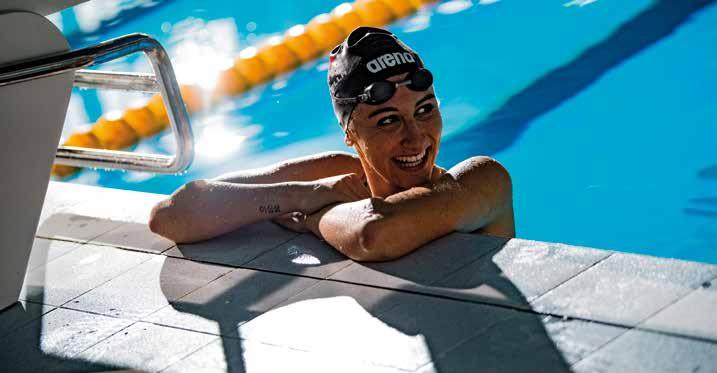
7 minute read
Watch out, there’s “Poison” in the pool
Nuova portabandiera del nuoto femminile azzurro, Simona Quadarella vuole la rivincita sul destino beffardo che le ha rovinato (in parte) il debutto a cinque cerchi. Prima, però, c’è una gara speciale per confermare la leadership europea Watch out, there’s “Poison” in the pool Italy’s new female swimming frontrunner Simona Quadarella is keen to exact her revenge on a cruel fate that (partially) ruined her Olympic debut. But first comes a special competition to corroborate her European leadership Attente a voi, in vasca c’è “Veleno”
Con una sorella maggiore cresciuta in vasca e le gite in gommone con papà fin dalla più tenera età, Simona Quadarella non poteva che stringere un legame indissolubile con l’acqua. Tanto da diventare la più titolata nuotatrice italiana in attività: titolo mondiale a 19 anni, bronzo olimpico e sei medaglie d’oro europee, oltre ad altri dieci podi internazionali. Abituata a macinare chilometri nuotando 800 e 1500 metri stile libero, la 23enne ha debuttato in Nazionale a 15 anni, ma anni prima era già nota alle colleghe in vasca come “Veleno”, soprannome nato in famiglia per la determinazione che ha sempre mostrato a suon di bracciate. Sulla tabella di marcia il prossimo alloro da prendersi porta agli Europei di Roma, un’altra prima volta ricca di fascino per la nativa della Città Eterna.
Advertisement
With an elder sister raised in the
swimming pool and dinghy outings with her father from a tender age, Simona Quadarella could not but forge an enduring bond with water. So much so that she has become Italy’s most successful active female swimmer having secured a world title at the age of 19, an Olympic bronze medal and six European gold medals plus another ten international podiums. Accustomed to clocking up kilometres for the 800 and
by ALESSIO CAPRODOSSI foto/photo @MILAGRO
1500 metres freestyle, this 23-year-old made her debut in the national team at the age of 15, although she had already been known to her colleagues in the pool for years as “Poison”, a nickname coined by her family for the determination she has always shown when pounding out lengths. The next necessary laurel on her timeline will take her to the European Championships in Rome, another first time with pulling power for this native of the Eternal City.
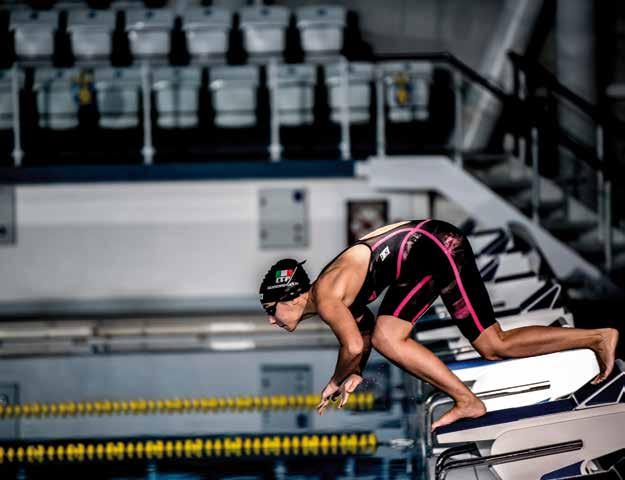
Che grinta!
“Veleno” è il soprannome dato in famiglia per la determinazione che Simona ha sempre dimostrato in vasca, a suon di bracciate
What grit!
“Poison” is the family nickname, selected because of the determination Simona has always shown pounding out the lengths in the pool
“Le mie gare sono 1.500 e 800 metri stile libero. Continuerò a farle entrambe per molti anni, poi magari accorcerò le distanze” “My competitions are the 1500 and 800 metres freestyle. I’ll continue doing both for many years and then maybe shorten the distances”

Delusione per l’indisposizione che ti ha debilitato prima dei 1500 metri stile libero e gioia per il bronzo conquistato negli 800 metri. Cosa ti ha lasciato l’Olimpiade di Tokyo?
“Un’esperienza strana perché non avevo mai avuto un malessere simile prima di una gara importante. Il quinto posto dopo il lungo lavoro di avvicinamento è stato deprimente. Sapevo però che c’era un’altra gara e, nonostante abbia perso 4 kg in 4 giorni, arrivare a medaglia è stata una grande vittoria”.
Con i Mondiali in Giappone posticipati per Covid-19, l’appuntamento dell’anno sono gli Europei di agosto a Roma. Una gara speciale…
“Sarà emozionante, anche perché è raro poter nuotare in casa. L’idea mi entusiasma e le aspettative degli altri non mi pesano, anzi sono uno stimolo in più. Voglio arrivarci in forma per fare il massimo”.
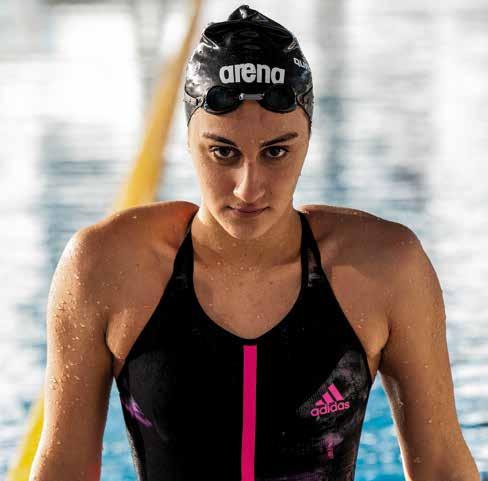
ph. Giulio Busi
Guardando più avanti c’è Parigi 2024, i prossimi giochi olimpici: in cosa devi migliorare per giocarti la vittoria?
“L’obiettivo è intensificare gli allenamenti sulle distanze e aumentare l’intensità sulla distanza. Ci sono vari dettagli da migliorare, come le virate e la velocità di base, perché anche se le mie sono gare di resistenza, bisogna essere veloci nella prima e nell’ultima parte. Sento che posso migliorare anche se i margini non sono enormi, ma tanti atleti si sono migliorati nell’ultima parte della carriera”.
Provieni da una famiglia di nuotatori e sei stata gettata in acqua da piccolissima. Qual è stato il momento in cui hai capito che saresti diventata una campionessa?
“La gara decisiva è stata a Budapest, Mondiali 2017, la mia seconda volta in Nazionale, quando vinsi il bronzo nei 1.500 metri stile libero. Desideravo quella medaglia ma sembrava un’ambizione troppo più grande di me. Lì ho capito che avevo la fame e la cattiveria necessaria per salire più in alto”.
Eredità condivisa
Nuova trascinatrice azzurra dopo l’addio di Federica Pellegrini? Siamo in tante ad andare forte, quindi non solo l’unica ad avere questa responsabilità
A shared legacy
“Am I the new Italian driving force now that Federica Pellegrini has retired? There are many of us who swim fast so I’m not the only one with this responsibility”
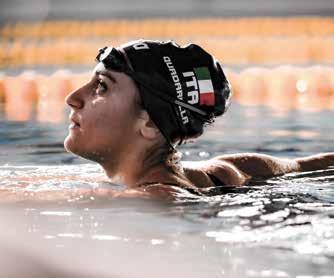
“In passato prima di una gara non chiudevo occhio per l’ansia, poi l’ho controllata. Non ho sentito il bisogno di un mental coach” “I would struggle to sleep before a competition because of nerves but then I controlled them myself without feeling the need for a mental coach”
Disappointment after an illness that weakened you before the 1500 metres freestyle and then the joy of a bronze medal in the 800 metres. What did you take away from the Tokyo Olympics?
“It was a strange experience because I’d been so ill before a major competition. After working so long to prepare my fifth place was depressing but I knew there was another competition and winning a medal after losing 4 kg in 4 days was a huge accomplishment.”
With the World Championships in Japan delayed because of Covid-19, the European Championships in Rome in August will be the big date of the year. A special competition…
“It will be emotional as you rarely get to swim on home ground. The thought thrills me and the expectations don’t weigh on me; on the contrary they give me added incentive. I want to arrive there on form and do my very best.”
Looking ahead to Paris 2024, the next Olympic Games. What do you have to improve for a chance to win?
“I aim to step up my distance training and boost my intensity over the distance. I have to improve on some details such as turns and base speed because, although my competitions are centred on endurance racing, you have to be fast in the first and last sections. I feel I can get better although the margins are not huge. Many athletes have improved in the last stages of their careers.”
You come from a swimming family and were thrown into the water at a very young age. When did you realise you would become a champion?
“The turning point was a competition in
Fuori dalla vasca, quali sono i tuoi hobby preferiti?
“Sono iscritta al corso di laurea in Innovative Technologies for Digital Communication della Link Campus University e allo studio dedico molto del tempo libero che ho. Sono un po’ indietro con gli esami ma va bene così”.
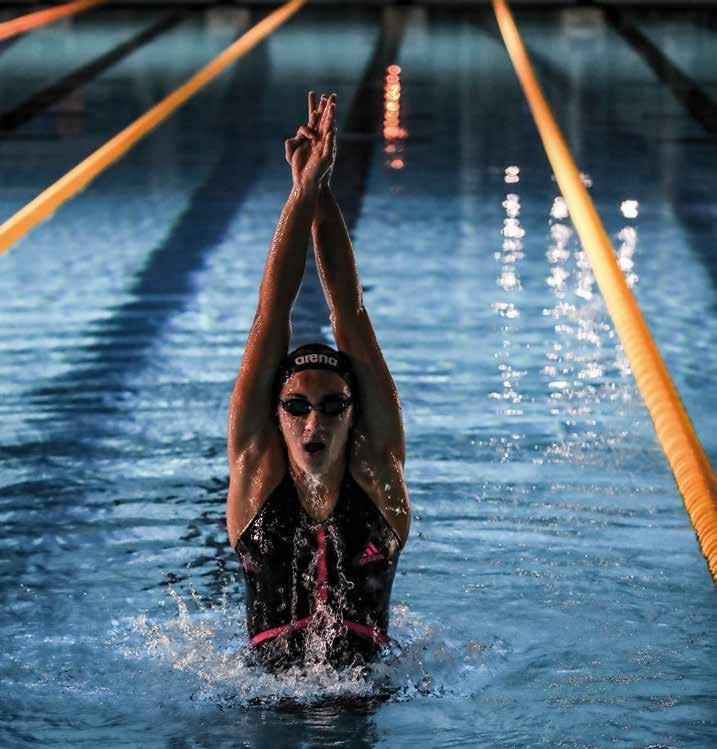
Come vorresti essere ricordata tra 100 anni?
“Come un’atleta che ha lasciato un segno e ha aiutato il nuoto italiano. Spesso mi dicono che sembro una persona sincera e umile: mi basta questo perché è un grande complimento”. Budapest, the 2017 World Championships, my second time in the national team and I won bronze in the 1500 metres freestyle. I wanted that medal but it seemed overambitious of me. That is when I realised I was hungry for it and had the stubbornness needed to rise higher.”
What are your favourite hobbies away from the pool?
“I’ve enrolled in a degree course in Innovative Technologies for Digital Communication at the Link Campus University and I spend much of my free time studying. I am slightly behind with my exams but that’s OK.”
How would you like to be remembered in 100 years’ time?
As an athlete who left a mark and progressed Italian swimming. People often tell me that I seem sincere and modest, which suits me because it’s a huge compliment.”










